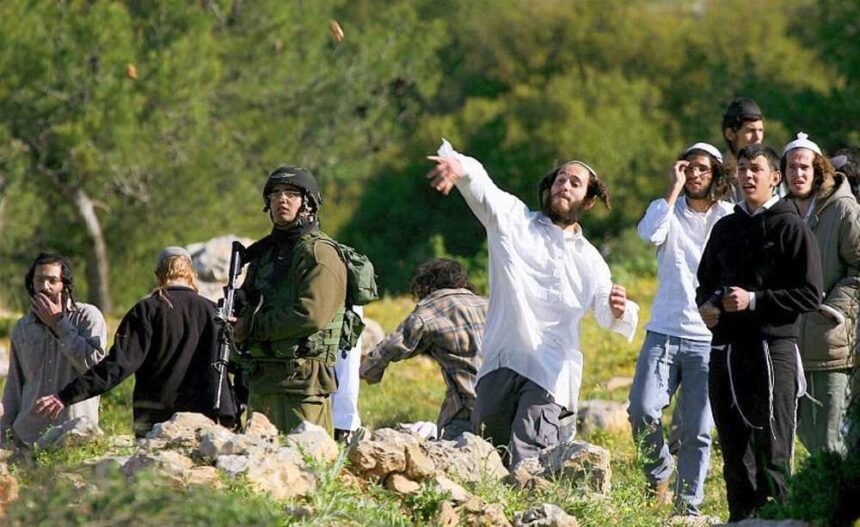Summary by News About Turkey (NAT):
Ahmet İnsel’s opinion highlights an ominous scenario where national leadership may accept or even promote forces within their community that intentionally undermine state security. This circumstance creates a paradox in which the very institutions intended to protect the nation may be undermined by political affiliations or goals. In Israel, the specific warning from the Shin Bet’s head indicates a crisis juncture at which state-sanctioned actions—or inactions—against extremism could exacerbate existing tensions into a larger conflict. This is more than just a political argument; it is a matter of national existence, as the possibility of intensified violence shifting from sporadic to systemic threatens the state’s core security framework.
The Israeli government’s apparent reluctance to confront the menace of Jewish terrorism, as underlined by Ronen Bar’s letter, indicates a fundamental political quandary. Political alliances with extreme elements may bring short-term benefits or stability to ruling coalitions, but they come at the expense of long-term national security and international stature. This dynamic is worsened by the volatile regional context, in which actions perceived to support extremism can quickly escalate relations with Palestinian communities and other governments.
Furthermore, the repercussions of such governance reach beyond the immediate security considerations. They address the moral and ethical foundations of the state. The notion that the government is incapable or unwilling to disassociate itself from extremist groups undermines public trust and international credibility. This circumstance parallels problems that may occur in any country if national leadership is regarded as collaborating with extreme groups, as İnsel hypothesizes about Turkey. The potential for this alignment to undermine judicial and security systems raises serious questions about democratic institutions’ durability in the face of growing nationalism and radicalism.
By drawing comparisons, İnsel not only criticizes his own government’s inclinations but also universalizes the issue, implying that no state is immune to the internal risks posed by extremist political ideas. This broader perspective functions as a cautionary tale for democracies worldwide, underscoring the necessity of vigilant and principled leadership to safeguard all citizens from extremism and maintain the rule of law. The debate over Israel and the hypothetical scenario in Turkey highlight the delicate balance between political authority and the preservation of civil order and national unity.
Read the full article below.
Jewish Terror in Israel
On the night of August 15th, the Palestinian village of Jit, near Nablus in the West Bank and surrounded by Israeli Jewish settler colonies, was raided by radical right-wing Zionists. According to some witnesses, the attackers numbered close to one hundred. Some of the masked attackers came from nearby Jewish settlements, while others came from farther away. As a result of the attackers’ gunfire, a 26-year-old Palestinian was killed, and five others were injured, one seriously. The attackers also set fire to four houses and six cars.
This pogrom targeting the residents of Jit village is not the first attack on Palestinian communities in the West Bank. Acts of violence such as the burning of olive and fruit trees, the destruction of fields, the looting of property, and the harassment of semi-nomadic Bedouins by Jewish settlers or extreme right-wing Zionist groups attempting to seize their land are almost weekly occurrences. However, this particular pogrom was openly condemned by the Israeli President, Prime Minister, and some ministers. Yet, the condemnations did not lead to further action.
The most notable development following the Jit pogrom was the emergence of a letter from Ronen Bar, the head of the Israeli intelligence agency Shin Bet, addressed to the Prime Minister, government members, and the Attorney General. The letter’s content, importance, and the clear and present danger posed by the Netanyahu government, which includes extreme right-wing ministers, were well summarized in an unsigned editorial in the August 25th edition of Haaretz. Let’s first read the translation of this editorial:
Haaretz Editorial:
“The letter sent by Shin Bet chief Ronen Bar to the Prime Minister, cabinet members, and the Attorney General, warning that Jewish terrorism poses a threat to the state’s existence, is a flashing warning light.
In a normal country, those responsible would not hesitate to do the right thing. They would distance the radical right from the government and instruct security agencies to approach Jewish terrorism with the same seriousness as Palestinian terrorism.
However, as long as National Security Minister Itamar Ben-Gvir and Finance Minister Bezalel Smotrich remain in the government, it will be impossible to fight Jewish terrorism. As long as one controls the police and the other the occupied territories, Jewish terrorism will know it has the support of the highest offices.
The picture painted in the Shin Bet chief’s letter is bleak. The letter describes a change in the nature of Jewish terrorist activities: ‘From focused covert activities to widespread open activities. From using lighters to using war weapons. From fleeing security forces to attacking security forces. From distancing themselves from the establishment to obtaining legitimacy from certain establishment figures. Sometimes, weapons legally distributed by the state are being used.’
If Israel continues to deny the bitter reality that the Jewish weed growing in its land is now out of control, Jewish terrorism will destroy Israel. Ronen Bar writes, ‘The phenomenon of “No’ar HaGva’ot” [Kahane-inspired far-right religious-nationalist youth movement] has long served as a platform for violence against Palestinians.’
Bar notes that the fear of administrative detention has disappeared, stemming from ‘the conditions provided in prison and the money they receive from Knesset members after their release, as well as the legitimacy and praise they obtain for their actions.’ This is accompanied by ‘a campaign of delegitimization against the security services.’ Ronen Bar warns that Jewish terrorism could ignite an additional front in the conflict.
The Shin Bet chief also describes police inaction and the secret support Jewish terrorists receive from the police. He particularly mentions Ben-Gvir and his visit to the Temple Mount site during Tisha B’Av, clearly stating that it ‘creates a very significant risk to regional security.’
Following the publication of this letter, Ben-Gvir demanded Bar’s dismissal at a cabinet meeting. When Netanyahu and other ministers supported Bar, Ben-Gvir left the meeting. However, experience shows that Netanyahu can change his mind when his voter base is angry. Bar has long been on the target list of Bibi’s supporters and the Kahane-inspired camp. After this warning letter, attacks from this camp against him will only increase.
Netanyahu, who has tied his political fate to the radical right, legitimized Kahanism, handed over control of the government to Ben-Gvir, and delivered the territories to Smotrich, is the last person who will fight Jewish terrorism.
Every day the far-right government led by Netanyahu continues to exist, Israel sinks deeper into an inescapable abyss. This government must be changed immediately.
As noted in the editorial, expecting the Netanyahu government to put an end to these ‘Jewish terror’ acts would be naïve. According to data compiled by the Israeli human rights organization Yesh Din, 95% of the violent incidents caused by Jewish settlers in the West Bank since 2005 have ended in impunity. Indeed, after the Jit pogrom, a person who had been detained was quickly released.
Haaretz’s editorial’s labeling of the radical, racist-religious Zionist militants whose actions are escalating in both the West Bank and Israel, and who draw power and support from extreme right-wing, racist ministers of the interior and finance, as ‘Jewish terrorism’ is certainly significant. But even more important is that this ‘Jewish terrorism’ has been highlighted by the head of Israel’s intelligence agency. It signals the danger of opening another war front alongside the war in Gaza.
While the Israeli government’s attacks in Gaza are verging on genocide, the Israeli intelligence agency chief exposes the growing threat within Israeli society—a far-right, racist-religious strain gaining strength with support from the government, police, and some other state institutions—and points to the imminent great danger this poses to ‘Israel’s future.’ Some dissenting Israeli politicians also emphasize that the real great danger to the existence of the Israeli state and society is growing within Israeli society itself.
Can you imagine the head of the Turkish Intelligence Service daring to warn the President, government members, and the Chief Prosecutor of the Supreme Court about the danger to the country’s future by using the term ‘Turkish terrorism’ in a situation where the head of racist radical nationalism is being petted by government partners in today’s Turkey?”
Ahmet İnsel (b. 1955) is a Turkish economist, editor, journalist and political scientist. Professor at the University of Paris 1, he regularly appears on the Turkish and foreign media, especially French, to talk about the political situation in his country.
The article was originally published in Birikim Magazine and has been translated from Turkish.



